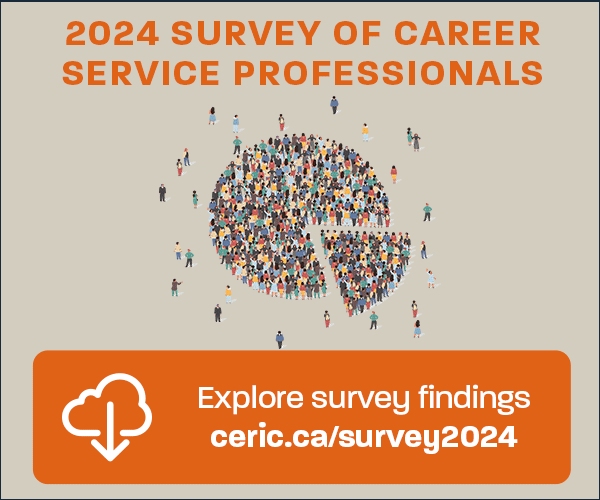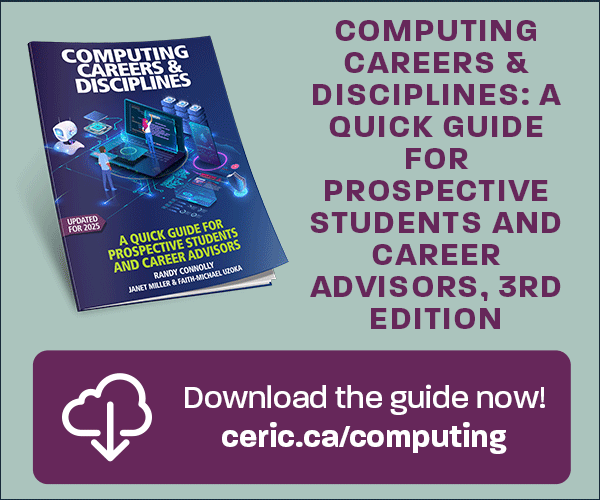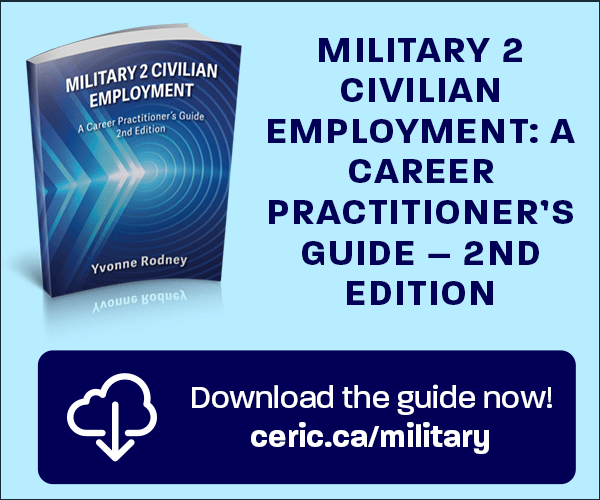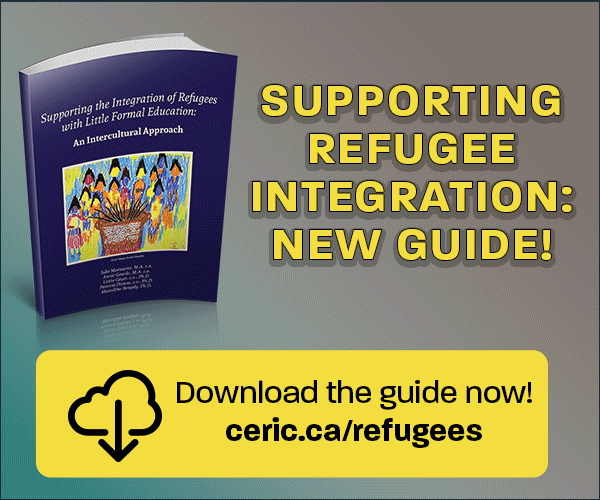Career Information Practices of Guidance Practitioners
DOI:
https://doi.org/10.53379/cjcd.2022.336Keywords:
career information practices, guidance practitioners, information sources, career information, occupational information, educational informationAbstract
Although career development theories underline the central role of information in career choice and studies show that guidance practitioners are among the main information sources of people making career choices, the actual information practices of these practitioners in their career interventions remain fragmented. Moreover, the studies on the theme of career choice associating information, information sources and information practices (whether it is among guidance practitioners or individuals in career choice) offer little conceptualization on these notions. In order to fill this gap, an online survey of 330 guidance practitioners in Quebec was conducted to document specifically their career information practices (information sources consulted and categories of career information sought). Statistical analysis show that the main career information sought relates to central elements of career choice (training programs and occupations) and the main information sources consulted are non-human and institutional. In addition, some contextual elements are associated with seeking and selecting certain categories of information and sources. The discussion highlights the importance of digital sources in the information practices of these practitioners, the association between the populations served and the choice of information sources and categories of career information and the role of co-workers as information support on career and beyond.
References
Aley, M., & Levine, K. J. (2020). From whom do young adults actively seek career information? An ego-network analysis of vocational anticipatory socialization. Communication Studies, 71, 351–367. https://doi.org/10.1080/10510974.2020.1735465
Agarwal, N. K., Xu, J., & Poo, D. C. (2011). A context-based investigation into source use by information seekers. Journal of the American Society for Information Science and Technology, 62(6), 1087-1104. https://doi.org/10.1002/asi.21513
Al-Suqri, M. N., & Al-Aufi, A. S. (2015). Information seeking behavior and technology adoption: theories and trends. IGI Global.
Ayachi, H. (2007), L’adéquation entre le système d’information et la veille stratégique dans une activité de construction de sens. , 2(12), 49-66.
Beidoglu, M., Dinçyürek, S., & Akintug, Y. (2015). The opinion of school counselors on the use of information and communication technologies in school counselors practices: North Cyprus schools. Computers in Human Behavior, 52, 466-471.
Belser, C. T., & Mason, E. C. M. (2021). A preliminary investigation of school counselors’ attitudes and behaviors toward research and professional information seeking. Professional School Counseling, 25(1), 1-9. https://doi.org/10.1177%2F2156759X211042844
Bimrose, J., Marris, L., Barnes, S.-A., & Mason, A. (2006). Labour market information: Broadening horizons and connecting practitioners. In H. Reid & J. Bimrose (Eds.), Constructing the future IV: Transforming career guidance (pp. 89–102). Institute of Career Guidance.
Brown, S. D., Ryan Krane, N. E., Brecheisen, J., Castelino, P., Budisin, I., Miller, M., & Edens, L. (2003). Critical ingredients of career choice interventions: more analyses and new hypotheses. Journal of Vocational Behavior, 62(3), 411-428. https://doi.org/10.1016/S0001-8791(02)00052-0
Brown, D. (2012). Career information, career counseling and career development. (10th ed.). Pearson Education Inc.
Buckland, M. (1991). Information as thing. Journal of the American Society for Information Science, 42(5), 351-360.
Byström, K. (2002). Information and information sources in tasks of varying complexity. Journal of the American Society for Information Science and technology, 53(7), 581-591. https://doi.org/10.1002/asi.10064
Capurro, R., & Hjørland, B. (2003). The concept of information. Annual Review of Information Science and Technology, 37(1), 343-411.
Chaudiron, S., & Ihadjadene, S. (2009). De la recherche de l’information aux pratiques informationnelles. Études de communication, 35, 13-30.
Chin, M. Y., Blackburn Cohen, C. A., & Hora, M. T. (2018). The Role of Career Services Programs and Sociocultural Factors in Student Career Development. WCER Working Paper No. 2018-8. https://files.eric.ed.gov/fulltext/ED545233.pdf
Clavier, V. (2019). La place de l’information dans les pratiques professionnelles des diététicien.nes : au croisement des missions d’éducation, de prévention et de soin. I2D – Information, données et documents, 1(1), 114-133. https://doi.org/10.3917/i2d.191.0114
Conseil de l’information sur le marché du travail (CIMT) (2020). De quelles compétences ai-je besoin ? Faire bénéficier les canadiens du système O*NET des États-Unis. Perspectives de l’IMT, 31, 1-14.
Conseil de l’information sur le marché du travail (CIMT) (2019). Données et informations : de quelle IMT les professionnels en développement de carrière ont-ils besoin ? Perspectives de l’IMT, 20, 1-6.
Crowley, J. L., & High, Andrew, C. (2018). Parents’ information seeking during adolescent career development: a test of the theory of motivated information management. Journal of Applied Research, 46(3), 348-367. https://doi.org/10.1080/00909882.2018.1468570
Dinet, J., & Rouet, J.-F. (2002). La recherche d’information: processus cognitifs, facteurs de difficultés et dimension de l’expertise. In C. Paganelli (Ed.), Interaction homme-machine et recherche d’information (pp. 133-161). Hermès.
Dislere, V., & Vronska, N. (2020). Evaluation of career counsellors’ competences in career guidance. Rural Environnement. Education. Personnality, 13, 385-398.
Drummond, D., Beale, E., Kolby, K., Loiselle, M., & Miner, R. (2009). Working together to build a better labour market information system for Canada. Advisory Panel on Labour Market Information.
Dubar, C., Tripier, P., & Broussard, V. (2015). Sociologie des professions. Armand Colin.
Du Preez, M. (2019). The consulting industry as an information behaviour context: consulting engineering as an example In Proceedings of ISIC, The Information Behaviour Conference, Krakow, Poland, 9-11 October: Part 2. Information Research, 24(1), paper isic1833. http://InformationR.net/ir/24-1/isic2018/isic1833.html
Emploi-Québec (2020a). Conseillers/conseillères en emploi. http://imt.emploiquebec.gouv.qc.ca/mtg/inter/noncache/contenu/asp/mtg122_descrprofession_01.asp?Porte=1&prov=ESAC&cregncmp1=qc&lang=FRAN&pro=4156
Emploi Québec (2020b). Conseillers/conseillères en information scolaire. http://imt.emploiquebec.gouv.qc.ca/mtg/inter/noncache/contenu/asp/mtg122_sommprofs_01.asp?PT4=53&Porte=1&cregncmp1=QC&lang=FRAN&ssai=0&prov=E3=10&pro=4033&PT2=21&cregn=QC&PT1=25&type=01&motpro=conseiller+information+scolaire&aprof=4033
Fischer, K. E., Erdelez, S., & Mc Kechnie, L. E. F. (2005). Theories of information behavior. Information Today.
Gacohi, J. N., Sindabi, A. M., & Chepchieng, M. C. (2017). Influence of career information on choice of degree programme among regular and self-sponsored students in public universities, Kenya. Journal of Education and Practice, 8(11), 38-47.https://doi.org/10.1111/j.1471-1842.2009.00860.x
Gallagher, S., & Olsson, M. (2019). Reconciling doctor as clinician and doctor as entrepreneur: the information practices and identity work of early career surgeons. In Proceedings of RAILS - Research Applications, Information and Library Studies, 2018, Faculty of Information Technology, Monash University, Australia, 28-30 November 2018. Information Research, 24(3), paper 1810. http://www.informationr.net/ir/24-3/rails/rails1810.html
Gardiès, C., Fabre, I., & Couzinet, V. (2010). Re-questionner les pratiques informationnelles. Études de communication, 35, 121-132.
Gati, I., & Levin, N. (2015). Making better career decisions. In P. J. Hartung, M. L. Savickas and W. B. Walsh (Eds.), Handbook of career intervention (pp. 193‑207). American Psychological Association.
Gati, I., & Amir, T. (2010). Applying a systemic procedure to locate career decision-making difficulties. Career Development Quarterly, 58(4), 301-320. https://doi.org/10.1002/j.2161-0045.2010.tb00180.x
Gore Jr, P. A., Leuwerke, W. C., & Kelly, A. R. (2012). The structure, sources, and uses of occupational information. In S. D. Byström. and R. W. Lent (Eds.), Career development and counseling: Putting theory and research to work (2nd ed., pp. 507-535). John Wiley & Sons.
Goudet, J. d’Arc, Mujawamariya, D., & Lapointe, C. (2010). Les perceptions de conseillères et de conseillers en orientation face à leurs pratiques d’intervention en milieu scolaire : une analyse féministe. Revue des sciences de l’éducation, 36(2), 365-387.
Gouvernement du Québec (2017). Code des professions. Gouvernement du Québec.
Griffin, D., Hutchins, B. C., & Meece, J. L. (2011). Where do rural high school students go to find information about their futures? Journal of Counseling & Development, 89(2), 172‑181.
Guichard, J. (2016). Une comparaison des apports des modèles de la construction de la carrière et de la construction de soi au life designing counseling. Psychologie française, 61(1), 15-29.
Harrison, J., Hepworth, M., & de Chazal P. (2004). NHS and social care interface: a study of social workers’ library and information needs. Journal of Librarianship and Information Science, 36(1), 27-35. https://doi.org/10.1177/0961000604042971
Hirschi, A. (2011). Career-choice readiness in adolescence: Developmental trajectories and individual differences. Journal of Vocational Behavior, 79(2), 340–348.
Hooley, T., Shepherd, C., & Dodd, V. (2015). Get yourself connected: Conceptualising the role of digital technologies in Norwegian career guidance. University of Derby, International Centre for Guidance Studies. http://derby.openrepository.com/derby/handle/10545/579570
Ihadjadene, S., & Chaudiron, S. (2009). Des processus aux pratiques : quels modèles informationnels pour analyser l’accès à l’information en contexte professionnel ? Évolutions technologiques et information professionnelle : pratiques, acteurs et documents, 1-12. https://hal.archives-ouvertes.fr/hal-00468728/document
Jakšić, K. & Perin, V. (2020). Career information seeking behavior of Croatian psychology students: preliminary data. Suvremena Psihologija, 23(1), 55-64.
Jenkins, L., & Jeske, D. (2017). Interactive support effects on career agency and occupational engagement among young adults. Journal of Career Assessment, 25(4), 616-631.
Kirk, R. E. (1996). Practical significance: A concept whose time has come. Educational and Psychological Measurement, 56(5), 746-759. https://doi.org/10.1177%2F0013164496056005002
Kniveton, B. H. (2004). The influences and motivations on which students base their choice of career. Research in Education, 72(1), 47-59.
Kumar S., & Arulmani, G. (2014). Understanding the labor market: implications for career counseling. In G. Arulmani, A. J. Bakshi, F. T. L. Leong & A. G. Watts (Eds.), Handbook of Career Development. International Perspectives (p. 225-239). Springer Science+Business Media.
Kwasitsu, L. (2003). Information-seeking behavior of design, process and manufacturing engineers. Library & Information Science Research, 25(4), 459-476. https://doi.org/10.1016/S0740-8188(03)00054-9
Leckie, G. J. (2009). General model of the information seeking of professionals. In K. E. Fisher, S. Erdelez and L. McKechnie (Eds.), Theories of information behavior (pp. 158-163). Information Today Inc.
Leckie, G. J., Pettigrew, K. E., & Sylvain, C. (1996). Modeling the information seeking of professionals: a general model derived from research on engineers, health care professionals and lawyers. The Library Quarterly, 66(2), 161-193.
Le Codiac, F. (2004). La science de l’information. Presses Universitaires de France.
Liou, D. D., Antrop-Gonzalez, R., & Cooper, R. (2009). Unveiling the promise of community cultural wealth to sustaining Latina/o students’ college-going information networks. Educational Studies, 45, 534-555.
McKenzie, P. J. (2003). A model of information practices in accounts of everyday-life information seeking. Journal of Documentation, 59(1), 19-40.
Milot-Lapointe, F., Savard, R., & Paquette, S. (2017). Effet de l’information sur le marché du travail (IMT) : Comparaison entre l’utilisation autonome et assistée de l’IMT. Revue canadienne de développement de carrière, 16(1), 17-27.
Moring, C. (2017). Newcomer information seeking: the role of information seeking in newcomer socialization and learning in the workplace. In Proceedings of ISIC, the Information Behaviour Conference, Zadar, Croatia, 20-23 September, 2016: Part 2. Information Research, 22(1), paper isic1616. http://InformationR.net/ir/22-1/isic/isic1616.html
Obermeit, K. (2012). Students’ choice of universities in Germany: structures, factors and information sources used. Journal of Marketing for Higher Education, 22(2), 206-230. http://dx.doi.org/10.1080/08841241.2012.737870
Olsson, M., & Lloyd, A. (2017). Being in place: embodied information practices. Information Research, 22(1), CoLIS paper 1601. http://InformationR.net/ir/22-1/colis/colis1601.html
Organisation for Economic Co-operation and Development (OECD) (2004). Orientation professionnelle et politique publique. Comment combler l’écart. OECD.
Ordre des conseillers et conseillères d’orientation du Québec (OCCOQ) (2021). Rapport annuel 2020 | 2021. OCCOQ.
Ordre des conseillers et conseillères d’orientation du Québec (2020). Formation et permis d’exercice. https://www.orientation.qc.ca/informations-pour-le-public/le-conseiller-dorientation/formation-et-permis-dexercice
Ordre des conseillers et conseillères d’orientation du Québec (OCCOQ) (2019). Rapport annuel 2018 | 2019. OCCOQ.
Ordre des conseillers et conseillères d’orientation du Québec (OCCOQ) (2010). Profil de compétences générales des conseillers d’orientation. OCCOQ.
Ordre des conseillers et conseillères d’orientation et des psychoéducateurs et psychoéducatrices du Québec (OCCOPPQ) (2004a). Questionnaire sur l’inventaire des pratiques des conseillers et conseillères d’orientation en employabilité et en réadaptation. Rapport inédit remis à l’Ordre des conseillers et conseillères d’orientation et des psychoéducateurs et psychoéducatrices du Québec. OCCOPQ.
Ordre des conseillers et conseillères d’orientation et des psychoéducateurs et psychoéducatrices du Québec (OCCOPPQ) (2004b). Questionnaire sur l’inventaire des pratiques des conseillers et conseillères d’orientation en éducation. Rapport inédit remis à l’Ordre des conseillers et conseillères d’orientation et des psychoéducateurs et psychoéducatrices du Québec. OCCOPQ.
Owen, L., Poynton, T. A., & Moore, R. (2020). Student preferences for college and career information. Journal of College Access, 5(1), 68-100.
Paganelli, C. (2016). Réflexions sur la pertinence de la notion de contexte dans les études relatives aux activités informationnelles. Études de communication, 46, 165-187.
Perna, L. W. (2006). Understanding the relationship between information about college prices and financial aid and students’ college-related behaviors. American Behaviorist Scientist, 49(12), 1620-1635. https://www.proquest.com/docview/214763874
Robinson, K. J., & Roksa, J. (2016). Counselors, information, and high school college-going culture: inequalities in the college application process. Research in Higher Education, 57(7), 845-868. https://link.springer.com/article/10.1007/s11162-016-9406-2
Sampson, J. P., Kettunen, J., & Vuorinen, R. (2020). The role of practitioners in helping persons make effective use of information and communication technology in career interventions. International Journal of Educational and Vocational Guidance, 20, 191–208. https://doi.org/10.1007/s10775-019-09399-y
Sampson, J. P., Kettunen, J., & Vuorinen, R. (2019). The role of practitioners in helping persons make effective use of information and communication technology in career interventions. International Journal for Educational and Vocational Guidance, 20, 191-208. https://doi.org/10.1007/s10775-019-09399-y
Sampson, J. P., Osborn, D. S., Kettunen, J., Hou P.-C., Miller, A. K., & Makela, J. P. (2018). The validity of social media-based career information. The Career Development Quartely, 66(2), 121-134. https://doi.org/10.1002/cdq.12127
Sampson, J. P., & Osborn, D. S. (2014). Using information and communication technology in delivering career interventions. In P. J. Hartung, M. L. Savickas, & W. B. Walsh (Eds.), APA handbook of career intervention: Vol. 2. Applications (pp. 57–70). American Psychological Association.
Samson, A., Lauzier, M., & Cournoyer, L. (2014). État des lieux des pratiques d’orientation scolaire en Ontario. Rapport remis au Ministère de la Formation, des Collèges et Universités de l’Ontario.
Santamaria, J., & Watts, A. G. (2003). Public Policies and Career Development: A Framework for the Design of Career Information, Guidance and Counseling Services in Developing and Transition Countries. World Bank.
Savickas, M. L., Nota, L., Rossier, J., Dauwalder, J.-P., Duarte, M. E., Guichard, J., & Vignoli, E. (2010). Construire sa vie (Life designing) : un paradigme pour l’orientation au 21e siècle. L’orientation scolaire et professionnelle, 39(1), 5-39. https://doi.org/10.4000/osp.2401
Savickas, M. L., & Pouyaud, J. (2016). Concevoir et construire sa vie : un modèle général pour l’accompagnement en orientation au XXIe siècle. Psychologie Française, 61(1), 5-14. https://doi.org/10.1016/j.psfr.2013.11.003
Savolainen, R. (2008). Everyday information practices: A social phenomenological perspective. Scarecrow Press.
Shenton, A. K., & Dixon, P. (2004). Issues arising from youngsters’ information-seeking behavior. Library & Information Science Research, 26(2), 177-200. https://doi.org/10.1016/j.lisr.2003.12.003
Shen, Y. (2016). How credible are online product reviews? The effects of self-generated and system-generated cues on source credibility evaluation. Computers in Human Behavior, 55, 633–641.
Simões, C., & Soares, A.M. (2010). Applying to higher education: information sources and choice factors. Studies in Higher Education, 35(4), 371-389.
Sullivan, G. M., & Feinn, R. (2012). Using effect size – or why the P value is not enough. Journal of graduate medical education, 4(3), 279-282. https://doi.org/10.4300/JGME-D-12-00156.1
Supeno, E., Rivard, L., & Chabot, J. (2021). Pratiques informationnelles de jeunes adultes non diplômés. Revue Française des sciences de l’information et de la communication, 21. https://doi.org/10.4000/rfsic.10407
Supeno, E., Mongeau, V., & Pariseau, M.-M. (2016). Quand tout se joue …Bifurcations, horizon et informations. Revue jeunes et société, 1(2), 57-78.
Vakkari, P. (2005). Task-based information searching. Annual review of Information Science and Technology, 37(1), 413-464. https://doi.org/10.1002/aris.1440370110
Vest, J. R., & Jasperson, J. S. (2012). How are health professionals using health information exchange systems? Measuring usage for evaluation and system improvement. Journal of Medical Systems, 36, 3195-3204. https://doi.org/10.1007/s10916-011-9810-2
Walker, J.V. III, & Peterson, G. W. (2012). Career thoughts, indecision and depression: implications for mental health assessment in career counseling. Journal of Career Assessment, 20(4), 497-506. https://doi.org/10.1177/1069072712450010
Wilson, T. D. (2016). A general theory of human information behaviour In Proceedings of ISIC, the Information Behaviour Conference, Zadar, Croatia, 20-23 September, 2016: Part 1. Information Research, 21(4), paper isic160. http://InformationR.net/ir/21-4/isic/isic1601.html
Whiston, S. C., Li, Y., Mitts, N. G., & Wright, L. (2017). Effectiveness of career choice interventions: A meta-analytic replication and extension. Journal of Vocational Behavior, 100, 175-184. https://doi.org/10.1016/j.jvb.2017.03.010
Widén, G., Steinerová, J., & Voisey, P. (2014). Conceptual modelling of workplace information practices: a literature review. In Proceedings of ISIC, the Information Behaviour Conference, Leeds, 2-5 September, 2014: Part 1, (paper isic08). http://InformationR.net/ir/19-4/isic/isic08.html
Xu, Y., Tan, Y., & Yang, L. (2006). Who will you ask? An empirical study of interpersonal task information seeking. Journal of the American Society for Information Science and Technology, 57(12), 1666-1677. https://doi.org/10.1002/asi.20339
Yousefi, Z., Abedi, M., & Baghban, I. (2011). Personal and situational variables, and career concerns: predicting career adaptability in young adults. The Spanish Journal of Psychology, 14(1), 263-271.

Published
How to Cite
Issue
Section
License
Copyright (c) 2022 Canadian Journal of Career Development

This work is licensed under a Creative Commons Attribution-NonCommercial-NoDerivatives 4.0 International License.
















